

How to Write an Effective Resume
by Paul A. Werlin
President, Human Capital Resources, Inc.
www.humancap.com
Like a fine work of art, a resume can be a thing of beauty. But, like art, its beauty is in the eye of the beholder. Over the past few years, there have been dozens of books written to help people write effective resumes. There’s no lack of advice from “professionals” on the importance of writing a strong opening, or how to list your achievements. But what none of these professionals tell you is that there really is no one best way to write a resume. And, what they also don’t tell you is that in the scheme of things, while a resume is an important part of the entire process of getting a job, its importance has really been overrated.
For the most part, the person reviewing your resume is looking for only a few basic things. Like a well written newspaper story, the reviewer is looking of the “who, what, when, where, and why”. A well-written resume provides this information in a well laid-out format, clearly and accurately stated. Let’s go into some detail on the “5W’s”.
- The “who” obviously is you. This information, typically at the top of the resume should always include your name, address, best phone number(s) to contact you and your email address. Many employers today use email exclusively.
- The “what” and “when” is the meat of your resume. You should cover your prior positions- name of firm, your job title, dates of employment, and a brief description of your duties, responsibilities and accomplishments. It is important to emphasize brief- personally, I recommend using 3-5 bullet point descriptions. There has been much research showing that when long paragraph are written, people typically read the first and last sentence, but skip much in between. Also, don’t forget to list your academic achievements including schools attended, dates and degrees. If you’ve attended professional training programs or received professional recognition or designations, be sure to list them. But remember, a resume is an abbreviated summary, not a biographical essay.
- “Where” should cover two different areas: where you were previously employed, and where you would be willing to accept a new position. It’s important to state if you are willing to relocate.
- The “why” really shouldn’t be a part of your resume, but rather should be included in your cover letter. If you’re looking for new challenges or your position was eliminated, this should be stated in your cover letter.
Finally, there a few general rules for good resumes. First, keep it short, a maximum of 2 pages. Anything longer will either not be read, or you’ll just look like you have an over-inflated ego. Also, it is very important that punctuation and spelling be perfect. Format really isn’t that important. So whether if you want to write an introduction stating your qualifications or your career objective, that’s fine. Just be cautious and realize that sometimes a resume is reviewed to find reasons to disqualify a candidate from consideration. So if you write that you’re looking for a sales management position, you’ll automatically be eliminated from marketing, training, and administrative opportunities. It’s also unnecessary to write that “reference will be furnished upon request”, since that’s obvious. Listing hobbies and interests is up to you. But if you have any special skills, talents, speak a second language, have licenses or professional designations, these should be listed.
In summary, the people that read your resume are simply looking for a “snapshot” of your professional history. Be clear, concise, and honest. Don’t leave gaps in your history, and try to show a logical progression in your career path. Like a fine piece of art, your resume should be visual pleasing, and make the viewer want to linger and learn more about the artist.
Paul A. Werlin is president of Human Capital Resources, Inc., one of the premier recruiting, consulting and specialized training providers in the bank investment program marketplace.
Make LicensedBanker.com your default homepage. Click here.
Partnership Opportunities — Find out how you can become a LicensedBanker.com partner.
Program Managers — Customize this site for your bank program.



